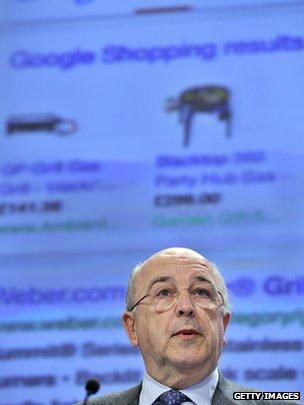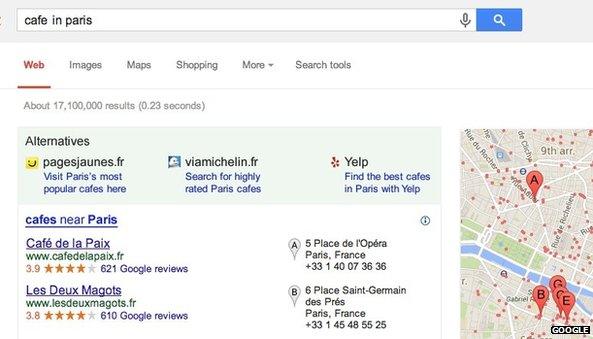Google to make 'significant' changes to avoid EU fine
- Published

EU competition boss Joaquin Almunia said users could now find the "best alternative"
Google has promised to make "significant" changes to how rivals appear in search results in an attempt to avoid a multi-billion euro fine.
The latest changes should be sufficient to end a three-year investigation into the search company, the EU's competition commissioner said.
Google had been accused of giving favourable treatment to its own products in search results.
The company said it looked forward to resolving the matter.
In a news conference, European Competition Commissioner Joaquin Almunia said he would not seek feedback on the deal from Google's rivals before it was formalised.
"I consider at this point that we don't need a market test," he told reporters.
'Massive failure'
The decision has prompted criticism from lobby groups, including the Microsoft-backed Initiative for a Competitive Online Marketplace (Icomp).
"A settlement without third party review is a massive failure," the group said.
"We need time and opportunity to ensure full technical assessment of how effective the proposed remedies would be."
Google argued that its proposals were fair and wide-reaching.
"We will be making significant changes to the way Google operates in Europe," said Google lawyer Kent Walker.
"We have been working with the European Commission to address issues they raised."
The move marks the third time Google has offered changes and concessions to its services in order to satisfy the EU's concerns.
Previous offers - such as displaying logos to denote when a Google product was being promoted - were not deemed to go far enough.
'Best alternatives'
The long-running and precedent-setting case arose when a group of 18 companies, including Microsoft and TripAdvisor, argued that Google had abused its position as the dominant search engine.
According to web metric company Comscore, Google has about a 75% share of the web search market in Europe.
In a statement, the European Commission said Google had now agreed to offer "comparable" treatment to its rivals.

Google will now have to give prominent placement to rivals
"Google has now accepted to guarantee that whenever it promotes its own specialised search services on its web page (e.g. for products, hotels, restaurants, etc.), the services of three rivals, selected through an objective method, will also be displayed in a way that is clearly visible to users and comparable to the way in which Google displays its own services."
To demonstrate this, the Commission published screenshots of how the changes would be implemented, external.
One showed a panel titled "alternatives" appearing at the top of search results on Google Maps. It directed users to other sites offering hotel and travel recommendations.
"My mission is to protect competition to the benefit of consumers, not competitors," Mr Almunia said.
He added that the change provided "users with real choice between competing services presented in a comparable way; it is then up to them to choose the best alternative".
Follow Dave Lee on Twitter @DaveLeeBBC, external
- Published1 October 2013
- Published3 January 2013
- Published19 December 2012